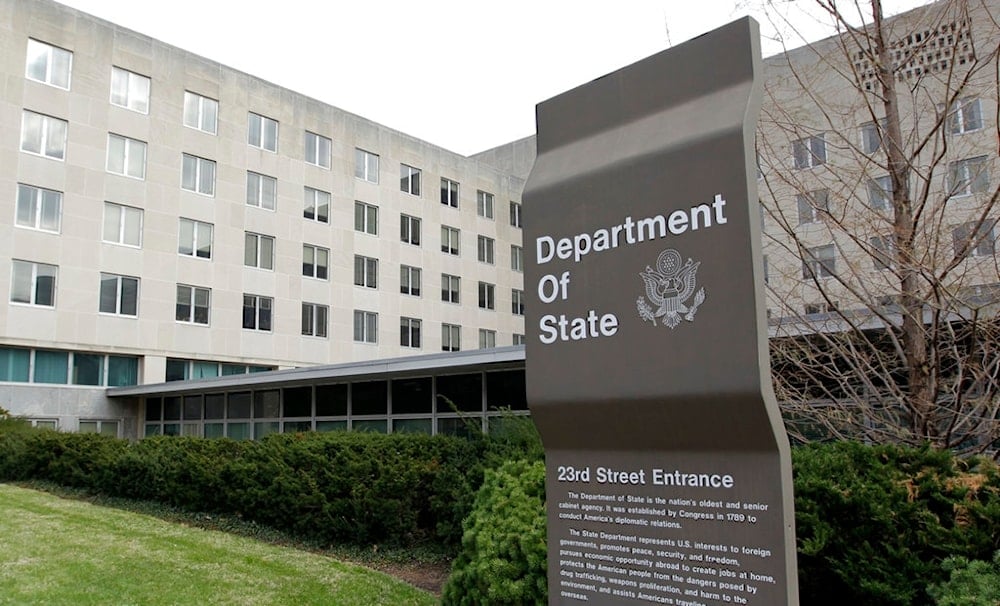US to sanction Sudan over alleged use of chemical weapons in 2024
The sanctions, expected to take effect around June 6, will target Gen. Abdel Fattah al-Burhan and the Sudanese Armed Forces (SAF).
-

In this Dec. 15, 2014 file photo, the State Department in Washington. State Department email service has been restored after a nearly 12-hour worldwide outage hit its entire unclassified system (AP Photo/Luis M. Alvarez, File)
The United States announced Thursday that it will impose sanctions on Sudan following a formal determination that the Sudanese Armed Forces (SAF) used chemical weapons during the country's civil war in 2024. The move, grounded in the Chemical and Biological Weapons Control and Warfare Elimination Act of 1991, remains unverified by international bodies and will take effect after a 15-day congressional notification period.
"On April 24, 2025, the United States determined under the Chemical and Biological Weapons Control and Warfare Elimination Act of 1991 that the Government of Sudan used chemical weapons in 2024," said State Department spokesperson Tammy Bruce.
"Following a 15-day Congressional notification period, the United States will impose sanctions on Sudan, including restrictions on US exports to Sudan and on access to US government lines of credit."
The sanctions, expected to take effect around June 6, will target Gen. Abdel Fattah al-Burhan and the SAF, which has been engaged in a brutal power struggle since 2023 with the Rapid Support Forces (RSF), led by Mohamed Hamdan Dagalo (Hemedti).
UAE's arming of RSF raises questions about US neutrality
What adds complexity to the US move is its timing, which comes just weeks after a May 2025 Amnesty International investigation revealed that the United Arab Emirates (UAE) violated the UN arms embargo on Darfur by supplying advanced Chinese weaponry to the RSF. Amnesty documented the use of GB50A guided bombs and AH-4 howitzers, both Chinese-made and re-exported by the UAE, in RSF operations in Khartoum and Darfur.
"The presence of recently manufactured Chinese bombs in North Darfur is a clear violation of the arms embargo by the UAE," said Amnesty's Head of Crisis Research, Brian Castner.
Despite these revelations and the fact that the RSF has been widely accused of ethnic cleansing, systematic sexual violence, and war crimes, no additional US sanctions were announced against UAE-linked actors. Analysts note that this asymmetry in accountability appears at odds with US claims of neutrality, especially given the deepening strategic partnership between Washington and Gulf states, particularly the UAE.
Read more: Trump, Qatar sign largest Boeing deal, tout $1.2T 'economic exchange'
The timing has prompted speculation that the US decision to single out the SAF for a chemical weapons allegation, absent multilateral confirmation, may be shaped in part by its broader geopolitical realignment in the Gulf. Critics argue that Washington's silence on the UAE's arming of the RSF, exposed not only by Amnesty but also by earlier UN Panel of Experts reports, risks undermining the credibility of its sanctions regime and humanitarian messaging.
ICJ ruling adds legal tension
Just days before the Amnesty report, the International Court of Justice (ICJ) dismissed a genocide case filed by Sudan against the UAE, citing a jurisdictional technicality. While the ICJ did not examine the substance of Sudan's allegations that the UAE had fueled RSF-led atrocities in Darfur, its ruling marked a legal setback for Khartoum and removed, for now, a multilateral path to accountability against external RSF backers.
Although chemical weapons use would constitute a serious breach of international law, no independent verification has been issued by the Organisation for the Prohibition of Chemical Weapons (OPCW) or a UN-led mechanism. This leaves the US to claim a unilateral finding, leading legal scholars and humanitarian observers to warn that such moves, without a transparent, multilateral investigation, could politicize arms control norms and erode global trust in mechanisms designed to protect civilians.
Sanctions in a broken landscape
This latest action follows previous US measures in January 2025, when both Hemedti and Burhan were sanctioned over atrocities committed by the RSF and SAF. However, the new designation of chemical weapons use is the most severe charge yet, and could further fracture Sudan's already dire humanitarian landscape.
The war has devastated Sudan's economy, displaced millions, and created one of the world's most urgent humanitarian crises. Aid organizations fear that additional US sanctions, particularly if not paired with meaningful diplomacy, could worsen civilian suffering and further obstruct humanitarian access.
In the absence of international consensus or verified evidence, the US position is likely to remain controversial. Some view the move as a necessary response to atrocity; others see it as a strategic maneuver shaped by shifting alliances in the Gulf, one that risks inflaming rather than resolving the crisis in Sudan.
Read more: Former UN official Kamil Idris appointed as Sudan’s new prime minister

 5 Min Read
5 Min Read










